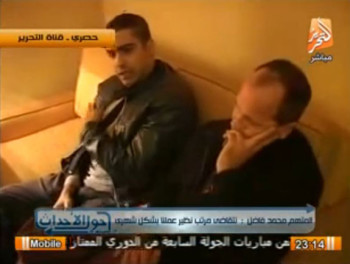
Al Jazeera journalists, Egyptian-Canadian Mohamed Fahmy and Australian Peter Greste, sit on a couch in Marriott Hotel rooms during a police interview before their arrest, December 29, 2013. (Screenshot, YouTube video by altahrirtvchannel, published February 2, 2014).
On Day of Arrest, AJ Journalist Tells Police the Network Doesn’t Film Protests in Egypt, Insists It Does Have Press Passes
December 29, 2013, Video by altahrirtvchannel, published February 2, 2014.
OFFICER, UNIDENTIFIED: I’ll tell you, why are you in a hurry? Are you afraid of something?
MOHAMED FAHMY, JAILED AL JAZEERA ENGLISH BUREAU CHIEF: I’m not afraid of anything, I’m not afraid of anything at all.
OFFICER: Did we do anything to you?
FAHMY: No
OFFICER: Did anyone verbally insult you?
FAHMY: No. There isn’t anything—
OFFICER: We just want to make sure, did anyone ask you for anything?
OFFICER: Are you certain about what happened here?
FAHMY Nods.
MOHAMED FAHMY, JAILED AL JAZEERA ENGLISH BUREAU CHIEF: None of the pieces of equipment that are mentioned here are owned by me, not even a slight part of them are mine at all. Not at all. None of these things are mine in any way.
POLICE OFFICER, UNIDENTIFIED: I heard. That is very strange.
FAHMY: None of the equipment that you found are mine. Everything you found is owned by the Al Jazeera English channel.
OFFICER: What about the cameramen? Who are those men who were filming?
FAHMY: The cameramen went to their homes.
OFFICER: Who are they? [reporter stutters]. Yes, how many are there?
FAHMY: There is more than one.
OFFICER: Yes, but who and who? Tell me their names. I want to know who they are to verify that all of your words are accurate.
FAHMY: They are all registered under “press.” They have press passes.
OFFICER: Right. But who are they? What are their names so that we can check that what you are saying is true.
FAHMY: [laughs]
OFFICER: Do you not know their names?
OFFICER: Alright, who are they? Like, who was working there with you? You don’t want to say?
FAHMY: No, I don’t want to say. [Indistinct voices interrupt]. They are all registered in the press. They have press passes from the ministry.
OFFICER: Yes, but who are they?
OFFICER: Right. When you conduct night interviews, shouldn’t the cameramen be there?
FAHMY: We don’t conduct interviews inside.
OFFICER: Alright, then why are there cameras and lights in the room?
FAHMY: [interrupts] Yes, yes.
OFFICER: Does the cameraman come inside?
FAHMY: Yes.
OFFICER: So the cameraman will come into the room upstairs?
FAHMY: Yes, yes.
OFFICER: When was the last interview you conducted?
FAHMY: There are no interviews in that room. We don’t conduct interviews in that room . We go outside to conduct interviews, on the street. No, we don’t bring people and film them in the room. Do you get what I mean? That’s it.
OFFICER: Okay, then what about the cameras in the room—are they to film? The cameras in that room were ready to film. You’re telling me that they are ready to be taken to the street to film there? They were obviously ready in that room to be used.
FAHMY: The cameras were ready there so that the correspondent could speak on air.
OFFICER: Who is this correspondent? What is his name?
FAHMY: Myself and the man who is sitting next to me.
OFFICER: Who is he? What is the name of the man who is sitting next to you?
FAHMY: Peter
OFFICER: Mr. Peter
OFFICER: You haven’t told me. What was the last interview that you conducted?
FAHMY: In that room? We did not bring anyone to interview in that room. We filmed many things , we filmed..by example Fouad Negm’s funeral, many things on daily basis, but we do not conduct interviews in that room.
OFFICER: There are certain programs that you send?
MORE RELATED TO THIS STORY
…
>FAHMY: No, I don’t get a monthly salary.
OFFICER: So, you conduct interviews and based on that interview, they send you money?
FAHMY: No, also no.
OFFICER: Alright, then how do you deal with them [financially]?
FAHMY: There is something called you take a fee, or as in any Network like Dream or ONTV , It’s called freelancer, you get paid for your work. Well it’s like a monthly salary that is agreed upon.
OFFICER: Right. So every month or whenever you conduct an interview, you get paid for that service. Is this amount fixed or does it change?
FAHMY: It is fixed, to a certain extent.
OFFICER: Who purchased the equipment that you had?
FAHMY: Those are owned by the channel , I don’t own them.
OFFICER: Okay, who is paying the rent for the room?
FAHMY: Not me. The channel.
OFFICER: Okay, what is the purpose of you being in the hotel? Why didn’t you stay in the studio or stay in an outside apartment? Why do you specifically need to stay in a hotel?
FAHMY: Myself personally—or for the filming?
OFFICER: Yes, why did they select this hotel?
FAHMY: It could have been any hotel, it didn’t specifically need to be this one.
OFFICER: Right, but why a hotel? Why didn’t they select a studio or an apartment to film in at another location?
FAHMY: Just as when I worked for CNN—I worked at many channels—any channel, they work from hotels, [Indistinct], Marriott Hotel, Novotel Hotel.
OFFICER: Right, if there is a live feed. However, why do you fully reside in the hotel? As you said, you film the programs outside in the streets, then you don’t need that room to film in, you get me?
FAHMY: It is a place to work in. Nothing more.
V: Right, but this workspace, why can’t it be at the studio?
FAHMY: Yes, we are trying to find a place to be in.
OFFICER: But why does it have to be in a hotel? How long have you been here?<
FAHMY: Three months.
OFFICER: In three months, you couldn’t find an outside place to be in?
FAHMY: No, we did look. Not me personally—the channel did. I am just an employee.
OFFICER: Who handles your business at the Al Jazeera channel? Who directly corresponds with you one-on-one?
FAHMY: The management.
OFFICER: Who are they?
FAHMY: The management team in Qatar.
OFFICER: In Qatar? Who are these people in Qatar? Like who and who?
FAHMY: The managers there
OFFICER: Right, but what are their names? Be specific, tell me their names.
POLICE OFFICER, UNIDENTIFIED: Do you have a permit to film?
FAHMY: Me, myself, personally?
OFFICER: Yes.
FAHMY: The channel has press passes, not the Live Al Jazeera in Arabic.
POLICE OFFICER, UNIDENTIFIED: Did you have press credentials from the ministry?
FAHMY: Me? I had a press card.
OFFICER: Did you renew it?
FAHMY: No, not yet.
OFFICER: When did you get it?
FAHMY: Not sure, can’t recall, it has been a long time since it had expired.
FAHMY: I was with CNN, my press pass was from CNN, I got it there. Okay? If you go there you’ll find it . I just started with Al Jazeera, I have been with them for exactly three months. I have only been dealing with Al Jazeera for three months exactly.
OFFICER: The last time you were in Qatar was when?
FAHMY: In the month of September, when I went to have the [job] interview.
OFFICER : That’s it?
FAHMY: That’s it.
OFFICER: Did you go from Qatar to Turkey?
FAHMY: No, directly to here [Egypt] and started to work. That’s it.
OFFICER: Does your payment get converted via the bank or do you have someone here who gives the money to you?
FAHMY: The bank.
OFFICER: The hotel expenses they charge it directly or do you pay and you send them the receipts and they reimburse you?
FAHMY: No, they handle it.
OFFICER: So, they have a representative to pay the expenses?
FAHMY: An employee.
OFFICER: An employee of the channel?
FAHMY: Yes.
OFFICER: He comes and pays?
FAHMY: Yes.
OFFICER: Who is this employee? What is his name—the person who you deal with?
FAHMY: The person who handles finances.
OFFICER: What is his name?
FAHMY: His name is Mustafa.
OFFICER: Mustafa what [last name]? Because I want to ask him to confirm what you have been saying. I would like to know information about him, like what his name is…
FAHMY: Mustafa Hawaa. Mustafa Hawaa is in charge of the finances.
OFFICER: Where does he reside? Where is his office?
FAHMY: No, we—I’ve never entered the office of Al Jazeera. The Al Jazeera office is located at the building near the museum. At the Hilton Ramses. That is the headquarter, in that building. I’ve never actually been in it.
OFFICER: That is the base.
FAHMY: Yes.
OFFICER: So, currently, where is Mustafa staying?
FAHMY: I don’t know, I don’t know his address.
OFFICER: Then how do you deal with him?
FAHMY: He comes here, he comes to handle expenses here.
OFFICER: So, you call him on the phone and he comes to take care of the finances?
FAHMY: Yes. Not just me—I’m just a correspondent.
OFFICER: Do you have Mustafa’s phone number?
FAHMY: Yes, of course.
OFFICER: So when you film those segments outside, how do you give it to them?
FAHMY: The internet.
OFFICER: The internet? Okay, we found two pieces of equipment with you, one does live internet streaming and another via a phone line. Do you send them yourself?
FAHMY: No, I don’t personally send them myself. I don’t even understand these things at all. I am just a guy who talks. The technical stuff, I don’t even know how it works from here to there.
OFFICER: Then who fixes these cameras for you?
FAHMY: The team handles it—we have cameramen and that is their job.
OFFICER: Do you only work for Al Jazeera or do you also work for the BBC?
FAHMY: No, I was working for CNN for three years and then I worked for many companies, like the BBC, I also wrote articles.
OFFICER: So you work exclusively for Al Jazeera?
FAHMY: At this time, there is no other venue aside from Al Jazeera.
OFFICER: Peter, is he a reporter?
FAHMY : Yes.
OFFICER: What is his full name?
FAHMY: Peter Greste.
OFFICER: What kind of stuff do you film exactly?
FAHMY: Anything and everything.
OFFICER: What about the room?
FAHMY: The room? It’s where a reporter talks. That’s it.
OFFICER: [inaudible]
FAHMY: Today! Today there was an explosion in Sharkia.
OFFICER: You went out to film there?
FAHMY: No, we didn’t go out. We take the footage from Reuters, we broadcast it then a reporter goes on the air saying “this and this happened.”
OFFICER: You didn’t go out to film there?
FAHMY: No, not at all.
OFFICER: Then what is the purpose of the smaller cameras?
FAHMY: The smaller cameras are there, but we did not leave to film there.
OFFICER: You film regularly with people?
FAHMY: Yes.
OFFICER: Does Peter have anything with him—any press credentials? Does he have any document to say that he is the correspondent?
FAHMY: No.
OFFICER: You don’t either, right?
FAHMY: We submitted the paperwork and we are still awaiting their response.
OFFICER: Does anyone have any credentials on the team that you work with?
FAHMY: Yes, of course.
OFFICER: Who? Is he available? Tell me his name so we can check on this information.
FAHMY: The two cameramen.
OFFICER: What are their names?
FAHMY: Omar and Mahdy.
OFFICER: Omar what [last name]? So that I can go back and check on this. What is his full name?
FAHMY: Omar Mohamed.
OFFICER: Omar Mohamed what?
FAHMY: I don’t know.
OFFICER: Okay, Mahdy?
FAHMY: Mahdy El-Anani. They have credentials, they have been working in this industry for 30 years and on many different channels, and with Gohar. These are very respectable workers, it’s not just anyone that would be employed here.
OFFICER: The SNG cameras, do you have SNG Units?
FAHMY: No, not at all.
OFFICER: Was there a time when you went out and filmed protests? Or at the university, to send the footage over?
FAHMY: No. We take the footage from Reuters or AP and we take that from any channel that has an agreement and we send that. You’ll find that every channel has the same footage that they took from the same source. We just write text on it and broadcast that. We don’t film that footage ourselves.
OFFICER: So, you are the one who comments on these events from the footage?
FAHMY: Yes.
OFFICER: So what is the purpose of Peter being there?
FAHMY: Yes, he also comments. We have sometimes two, sometimes three commentators.
OFFICER: So you have other correspondents?
FAHMY: At this exact moment, no. I have been with Al Jazeera for three months, and I asked more than once, “Is our legal situation all sorted in Egypt?” and they said, “yes, legally everything is in order as Al Jazeera English.” Or else I would never had accepted the job.
OFFICER: We are not accusing you of anything, we are just asking you to verify this information. and we are here with warrants from the general deputy and you were present during the search, and you will be brought in front of the deputy general.
FAHMY: I just wanted it to be clear from my side.
OFFICER: Yes, and we will take this information to the proper authorities, and they will respectfully confirm this information. It is up to them. If there was an error from their side they will say “thank you, we were mistaken.” You are open to being investigated and brother Peter is also open, so they will decide.
OFFICER: Get in [the vehicle].
END
Translation by: Jasmine Bager, Shadi F. George, and Jwanah Qudsi
Transcript by Lindsey N. Walker
Al Jazeera journalists Mohamed Fahmy and Peter Greste are interrogated by police at the Marriott Hotel in Cairo on December 29, 2013. video by altahrirtvchannel
————————————————————————————————————
This video transcript is part of iMediaEthics’ investigative series on international media reporting on Egypt.
iMediaEthics’ editor-in-chief and publisher, Rhonda Roland Shearer, spent much of May and June in Egypt reporting for this series. She worked with Nader Gohar and his CNC team to produce video reports for iMediaEthics.
Go to Main Story>
————————————————————————————————————






